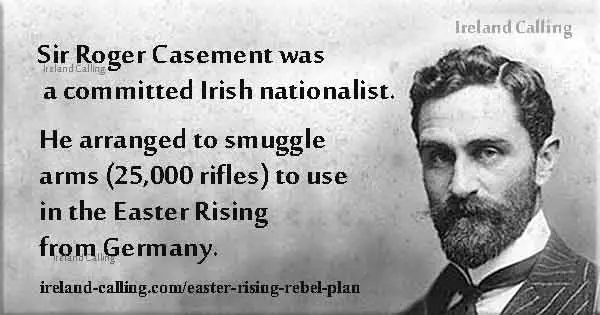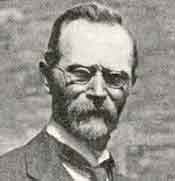The Easter Rising of 1916 was organised by the Military Council of the Irish Republican Brotherhood (IRB). The council was made up of seven members – Tom Clarke, Patrick Pearse, James Connolly, Seán MacDiarmada, Thomas MacDonagh, Joseph Plunkett, Éamonn Ceannt. All seven signed the Proclamation of the Irish Republic and all seven were later executed for their part in the Rising.
James Connolly had served in the British Army as a young man and Tom Clarke had taken part in an IRB bombing campaign in London, but neither they nor the other five council members could claim any extensive military experience. MacDiarmada and union leader James Connolly were great organisers and powerful speakers, while Pearse, MacDonagh, Ceannt and Plunkett knew far more about Irish language and culture than they did about fighting.
Nevertheless, despite their lack of military expertise, these seven idealists conceived a plan to take on the might of the British Empire and win idependence for Ireland. They were aware that there had been numerous failed rebellions before but they thought that this time could be different because Britain was pre-occupied with the war in Europe against Germany.They adhered to the principle that England’s difficulty was Ireland’s opportunity.
Their plan was to seize key buildings in Dublin and throughout the rest of the country and declare an Irish Republic before the British had time to react. The Council calculated that although the rebels would be small in number at the outset, they would quickly be joined by thousands of recruits from all across Ireland once the flame of revolution had been ignited. They thought that if they secured sufficient strongholds, and won the support of the Irish people, the British would unable to stop them, especially as it was already engaged in a full-scale war abroad. Whatever the merits of the plan in theory, the reality was very different.
The rebels lacked troops and proper weapons
The Council faced considerable difficulties in staging a rebellion. One of its major problems was that the IRB had few troops of its own. That meant it had to rely on other organisations such as the Irish Volunteer Force and the Irish Citizen Army. Both organisations contained men prepared to fight for the cause but co-ordinating them was to prove quite a challenge.
There was also the problem of the leaders of these different groups providing a united front. The leaders of the Irish Volunteers such as Eoin MacNeill and the O’Rahilly took a very pragmatic approach and believed a rebellion should only take place if they could procure enough armaments and if they had a realistic chance of success, or if the British Authorities started to crack down on nationalists by arresting leaders or banning the Volunteers from marching. Men like Pearse and MacDiarmada, however, took a more idealistic view and were prepared to contemplate offering themselves as martyrs in an attempt to inspire the Irish people towards fighting for independence.
By early 1916, the plans for the Rising were taking shape but there was still the major problem that the rebels lacked firepower, certainly the kind of firepower that could defeat the British army – one of the most powerful military forces in the world at that time.
Roger Casement tried to smuggle arms
The Council hoped to arm its troops with weapons smuggled in from Germany. Roger Casement, the son of a British army officer but a committed Irish nationalist, was sent to Germany to secure as many arms as possible.The German government agreed to send a consignment of 25,000 rifles on board a ship called the Aud. It set sail on 9th April with the intention of unloading the arms on the coast in Kerry in time for the Easter Rising. Meanwhile, the Military Council continued with its preparations and had to contend with difficult communication problems.

British intercept weapons
It was an underground organisation and the Easter Rising had to be kept secret until the very last moment when they were ready to strike. This proved virtually impossible and the British were able infiltrate some of the organisations involved and glean at least some idea of what was going on. The British authorities became aware of the arms from Germany aboard the Aud.
The weapons were seized as they were landed on the Kerry coast and Roger Casement was arrested. The loss of arms was a massive blow to the rebel cause. It would have had little chance of success even if the arms had become available, but without those arms it had virtually no chance at all.
Confusion reigned as volunteers told to stand down
 Most of the soldiers for the planned rising were members of the Irish Volunteer Force. When their leader, Eoin MacNeill, heard that the arms had been intercepted he argued that an Rising should be delayed until the rebels could be properly armed. The Military Council anticipated his opposition and knew they could not proceed with a credible rebellion without the support of the Volunteers under MacNeill’s command.
Most of the soldiers for the planned rising were members of the Irish Volunteer Force. When their leader, Eoin MacNeill, heard that the arms had been intercepted he argued that an Rising should be delayed until the rebels could be properly armed. The Military Council anticipated his opposition and knew they could not proceed with a credible rebellion without the support of the Volunteers under MacNeill’s command.
This led to creation of the infamous ‘Castle document’ purporting to reveal that the British authorties in Dublin Castle were planning to clamp down on all nationalist activity. This might have been enough for MacNeill to support a rebellion but he soon discovered that it was a forgery, created by members of the Council, possibly Plunkett and MacDiarmada, to persuade him to back the Rising.
As it turned out, it had the opposite effect. MacNeill was furious when he discovered that the document was a forgery and withdrew all his support. On Easter Saturday, the day before the Rising was due to begin, he sent his officers across the country to tell every unit of the Volunteers that they had been deceived and that the “planned operation” had been cancelled. MacNeill thought that the IRB Military Council would regroup and work out an alternative strategy for some future date. However, they were in no mood to wait.
Rebels completely outnumbered by British forces
The IRB Military Council held an emergency meeting and decided to go ahead with the Rising as planned except to delay the start by one day to April 24, Easter Monday. They believed they could still muster enough men in Dublin to get the Rising started and then Volunteers across the rest of the country would join in later once they realised what was happening.
The conflicting orders meant that although, some Irish Volunteers took part, most did not and consequently what should have been a national uprising was instead mainly confined to Dublin. In the end, only about 1,600 men at the most took part in the rising. Within days, they were facing more than 18,000 heavily armed British troops.
The Wolfe Tones with Banna Strand
Sir Roger Casement and the plan to bring in arms from Germany became the subject of a popular song, Banna Strand. Here it is performed by the Wolfe Tones.
easter-rising.html